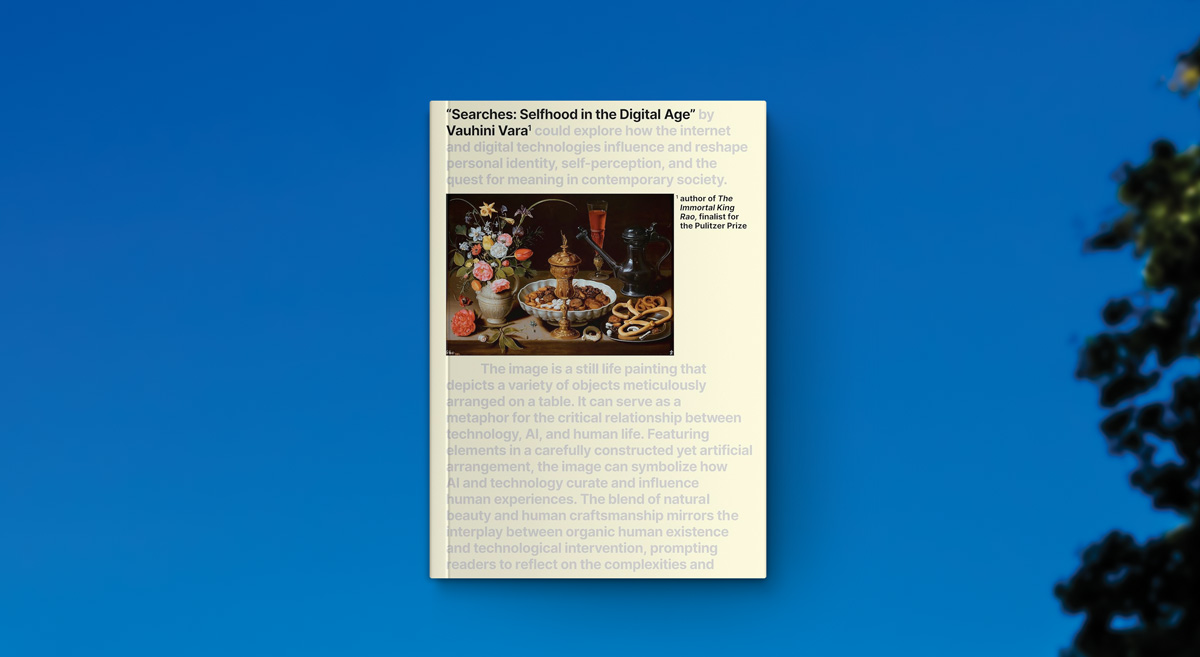Lately I’ve been listening to a lot of spontaneous, angst-ridden conversations between people about AI. Increasingly, those exchanges concern AI and creativity. Although few agree on just what creativity is, most nonetheless view it as one of the qualities that distinguish humans from machines, a putatively truer Turing Test for artificial intelligence. This is why many people feel existential nausea when they encounter some of the often deeply convincing chatbots that produce poems, novels, music, visual art, and so forth (a visceral unease described as the “uncanny valley” by robotics professor Masahiro Mori in 1970). What does this all mean for humanity—and, on a more intimate and immediate level, for our sense of self, both individually and collectively?
 Vauhini Vara (Photo: Brigid McAuliffe)
Vauhini Vara (Photo: Brigid McAuliffe)
Vauhini Vara, ’04, an award-winning novelist and technology reporter, puts her finger on the pulse of this vertiginous cultural moment in her most recent book, Searches: Selfhood in the Digital Age. Making sense of the moment you are living in as you live it is a near-impossible task. Vara, who grew up in Seattle, reflects on how her coming of age and career have been inextricably tied to the rise of the technology industry and Silicon Valley’s influence. She came into her own sense of self with (and through) the rise and increasing penetration of AOL and Google, and later Amazon, into nearly all facets of daily living and social interaction. That technological saturation, she explains, shaped her maturation—the very formation of so much of her and her generation’s identity.
“For me . . . writing is an attempt to put into language what the world is like from where I stand in it. The language doesn’t exist before the attempt begins; it’s the attempt itself that conjures the language into existence.”
Vara’s perspective makes Searches a fascinating read. Neither a manifesto nor a guide to AI, the book is a genre unto itself: part memoir, part chatbot experiment, part meditation on the complexities of language and communication, part critique of the technology industry, part confession of her succumbing to its commercial lures. She writes of the guilty ease of frictionless buying, well understanding the ethical sins that enable such convenience: the monetizing of personal data, the privacy violations, the exploitation of human labor and natural resources.
I was particularly struck by Vara’s revisiting the process of writing “Ghosts,” her experiment with OpenAI’s chatbot to help her tell the story of her sister’s death by cancer, which garnered public attention in print and social media. Some readers, she recalls, felt it proved AI could never replace writers, though, she writes, “in my opinion, GPT-3 had produced the best lines in ‘Ghosts.’ ” Others hailed it as exemplary of the future of AI-human collaboration. Through her poignant rewriting of the essay, she recognizes that the machine-generated lines she’d once admired had alienated her from her own language, her own truth, her own experience—and, powerfully, her own consciousness.
Michele Elam is a professor of English and a senior fellow at the Stanford Institute for Human-Centered Artificial Intelligence. Email her at stanford.magazine@stanford.edu.



